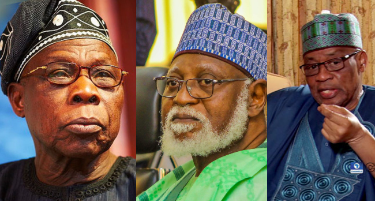In a significant development amid Nigeria’s ongoing security challenges, elder statesman and former President Olusegun Obasanjo convened a closed-door meeting with some of the nation’s most influential former leaders. This high-profile gathering, which took place in Minna, Niger State, brought together former Military President Ibrahim Babangida (IBB), former Head of State Abdulsalami Abubakar, and former National Security Adviser Aliyu Gusau. The meeting sparked widespread speculation and interest, given the stature of the participants and the current state of affairs in the country.
Obasanjo, a key figure in Nigeria’s political landscape, arrived in Minna on Sunday at approximately 4:15 pm. He traveled on a chartered flight from Edo State, where he had earlier attended a celebratory event. In Edo State, Obasanjo was seen paying homage to the Esama of Benin Kingdom, Gabriel Osawaru Igbinedion, marking his 90th birthday. This visit showcased Obasanjo’s continued engagement in national and regional matters, as he remains an active voice in Nigeria’s sociopolitical scene.
 Upon landing in Minna, Obasanjo wasted no time. He headed directly to the Hilltop residence of Ibrahim Babangida, another pivotal figure in Nigeria’s political history. Babangida, known for his long tenure as Military President from 1985 to 1993, has remained an influential figure in Nigerian politics. The residence, a well-known landmark in Minna, has historically been a hub for important political discussions and strategic meetings.
Upon landing in Minna, Obasanjo wasted no time. He headed directly to the Hilltop residence of Ibrahim Babangida, another pivotal figure in Nigeria’s political history. Babangida, known for his long tenure as Military President from 1985 to 1993, has remained an influential figure in Nigerian politics. The residence, a well-known landmark in Minna, has historically been a hub for important political discussions and strategic meetings.
Waiting at the residence were two other notable personalities: Abdulsalami Abubakar, who served as Nigeria’s Head of State from 1998 to 1999, and Aliyu Gusau, a seasoned security expert and former National Security Adviser. The presence of these figures added to the weight and significance of the meeting. Abdulsalami, credited with transitioning Nigeria back to civilian rule in 1999, is often consulted on matters of national importance, especially those involving security and governance. Aliyu Gusau, with his extensive background in national security, further underscored the nature of the discussions that might have been on the agenda.
Although the specifics of the meeting were not disclosed to the public, sources close to the former leaders provided some insight. They suggested that the discussions were likely centered around the escalating insecurity in Niger State and other regions of Northern Nigeria. In recent times, Niger State has been grappling with a surge in banditry and kidnapping, issues that have caused widespread concern and fear among residents. These security challenges have put immense pressure on local and national authorities to find lasting solutions.
The participation of these elder statesmen in such a meeting indicates the gravity of the situation and the potential for strategic dialogue aimed at addressing the security crisis. Their collective experience in governance, military strategy, and national security makes them well-positioned to deliberate on these pressing issues. In the past, similar gatherings of former leaders have been instrumental in shaping policy directions and offering critical advice to sitting governments.
Obasanjo’s initiative in facilitating this meeting is also noteworthy. As a former military ruler who later transitioned to a democratically elected president, he has a unique perspective on Nigeria’s multifaceted challenges. His efforts in engaging with other former leaders show a willingness to seek collaborative approaches to the country’s problems, especially those that threaten national stability.
The closed-door nature of the meeting, while fueling speculation, suggests a level of seriousness and a desire for candid discussions away from public scrutiny. In such settings, former leaders can freely exchange views, offer candid assessments, and propose solutions without the pressure of immediate public or political reaction. This confidentiality often allows for more effective strategizing, especially on sensitive issues like national security.
Given the current climate in Nigeria, with rising concerns over banditry, kidnapping, and other forms of insecurity, the outcome of such a meeting could be crucial. While the details remain under wraps, the mere fact that these leaders are coming together is a positive sign. It signals a recognition of the severity of the situation and a commitment to finding ways to assist the current administration in tackling these challenges.




